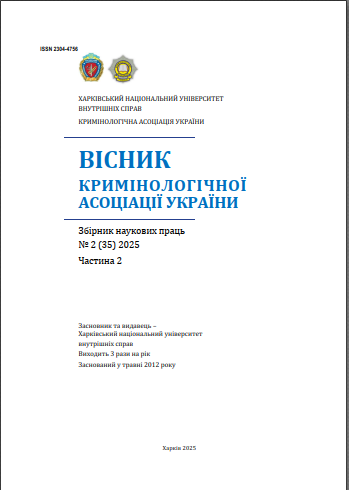INTERNATIONAL INSTITUTIONS OF THE UNITED NATIONS IN THE FIGHT AGAINST ORGANISED CRIME: SYSTEM AND FUNCTIONS
DOI:
https://doi.org/10.32631/vca.2025.2.37Keywords:
international cooperation, organized crime, transnational organized crime, preventionAbstract
The article examines the activities of leading international institutions of
the United Nations system in the field of combating organized and transnational
organized crime. The importance of international cooperation as a key factor in
countering criminal groups operating outside national jurisdictions is revealed.
Particular attention is paid to the role of the UN as a global coordinator in this
area, in particular through the activities of such structures as the United Nations
Office on Drugs and Crime (UNODC), the Commission on Crime Prevention and
Criminal Justice (CCPCJ), and the Conference of the Parties to the United Nations
Convention against Transnational Organized Crime.
The paper analyzes the functions of the United Nations Interregional Crime
and Justice Research Institute (UNICRI), the European Institute HEUNI, and
regional institutes in Latin America, Africa, and Asia. It highlights mechanisms for
coordination, information exchange, and the development of joint strategies, in
particular through the SHERLOC platform. The importance of an interdisciplinary
approach, research activities, and educational programs in the formation of an
effective system of international security and criminal justice is emphasized
separately.
Downloads
Downloads
Published
Issue
Section
License
Copyright (c) 2025 О.С. ГОРАШ

This work is licensed under a Creative Commons Attribution 4.0 International License.

